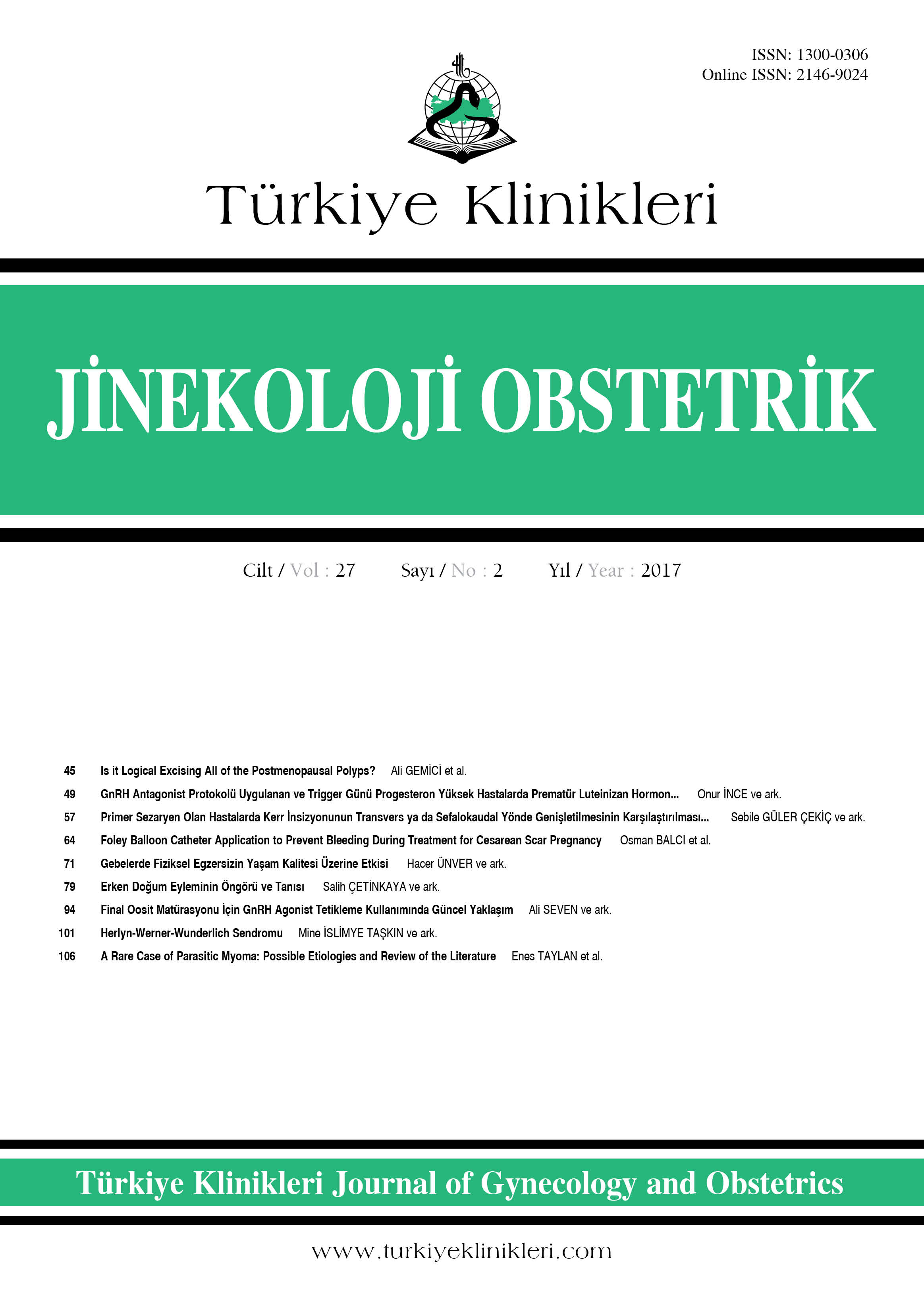Open Access
Peer Reviewed
ORIGINAL RESEARCH
4948 Viewed2902 Downloaded
The Effect of Physical Exercise on Quality of Life in Pregnancy
Gebelerde Fiziksel Egzersizin Yaşam Kalitesi Üzerine Etkisi
Turkiye Klinikleri J Gynecol Obst. 2017;27(2):71-8
DOI: 10.5336/gynobstet.2016-53373
Article Language: TR
Article Language: TR
Copyright Ⓒ 2025 by Türkiye Klinikleri. This is an open access article under the CC BY-NC-ND license (http://creativecommons.org/licenses/by-nc-nd/4.0/)
ÖZET
Amaç: Bu araştırma, gebelerde fiziksel egzersizin yaşam kalitesi üzerine etkisini belirlemek amacıyla yapılmıştır. Gereç ve Yöntemler: Araştırmanın evrenini; Malatya il merkezinde bulunan 10 Aile Sağlığı Merkezine kayıtlı 580 gebe oluşturdu. Araştırmanın örneklemini ise evreni bilinen örneklem hesaplamasına göre minimal örneklem büyüklüğü olan 230 gebe oluşturdu. Tanımlayıcı olarak yapılan bu araştırmanın verileri, Malatya il merkezinde bulunan aile sağlığı merkezlerinden Ekim 2013-Eylül 2014 tarihleri arasında toplandı. Veriler gebe tanıtım formu, egzersiz yarar ve engel ölçeği, yaşam kalitesi ölçeği kullanılarak toplandı. Verilerin analizinde; yüzdelik dağılımlar, t testi, Varyans Analizi (ANOVA), Kruskal-Wallis, Mann-Whitney U ve Pearson Kolerasyon testleri kullanıldı. Bulgular: Araştırma kapsamına alınan gebelerin %69,1'nin egzersizin faydalarını bilmediği ve %89,6'sının egzersiz yapmadığı belirlendi. Egzersiz yapanların yaşam kalitesi mental sağlık puanlarının yüksek ve istatistiksel olarak önemli olduğu saptandı (p<0,05). Bu araştırmadaki gebelerde egzersiz yarar ölçeği puanları ile yaşam kalitesi fiziksel puanları arasında pozitif yönde bir korelasyon saptandı (0,268, p=0,001). Egzersiz yapma durumları arttıkça toplam yaşam kalitesi puanlarının arttığı belirlendi. Sonuç: Gebelerde egzersizin yaşam kalitesini olumlu yönde etkilediği saptandı. Bu nedenle gebelerin yaşam kalitesini yükseltmek için hemşireler tarafından egzersizin gebelikteki önemi, faydaları hakkında eğitim verilmesi önerilmektedir.
Amaç: Bu araştırma, gebelerde fiziksel egzersizin yaşam kalitesi üzerine etkisini belirlemek amacıyla yapılmıştır. Gereç ve Yöntemler: Araştırmanın evrenini; Malatya il merkezinde bulunan 10 Aile Sağlığı Merkezine kayıtlı 580 gebe oluşturdu. Araştırmanın örneklemini ise evreni bilinen örneklem hesaplamasına göre minimal örneklem büyüklüğü olan 230 gebe oluşturdu. Tanımlayıcı olarak yapılan bu araştırmanın verileri, Malatya il merkezinde bulunan aile sağlığı merkezlerinden Ekim 2013-Eylül 2014 tarihleri arasında toplandı. Veriler gebe tanıtım formu, egzersiz yarar ve engel ölçeği, yaşam kalitesi ölçeği kullanılarak toplandı. Verilerin analizinde; yüzdelik dağılımlar, t testi, Varyans Analizi (ANOVA), Kruskal-Wallis, Mann-Whitney U ve Pearson Kolerasyon testleri kullanıldı. Bulgular: Araştırma kapsamına alınan gebelerin %69,1'nin egzersizin faydalarını bilmediği ve %89,6'sının egzersiz yapmadığı belirlendi. Egzersiz yapanların yaşam kalitesi mental sağlık puanlarının yüksek ve istatistiksel olarak önemli olduğu saptandı (p<0,05). Bu araştırmadaki gebelerde egzersiz yarar ölçeği puanları ile yaşam kalitesi fiziksel puanları arasında pozitif yönde bir korelasyon saptandı (0,268, p=0,001). Egzersiz yapma durumları arttıkça toplam yaşam kalitesi puanlarının arttığı belirlendi. Sonuç: Gebelerde egzersizin yaşam kalitesini olumlu yönde etkilediği saptandı. Bu nedenle gebelerin yaşam kalitesini yükseltmek için hemşireler tarafından egzersizin gebelikteki önemi, faydaları hakkında eğitim verilmesi önerilmektedir.
ABSTRACT
Objective: This study was conducted in order to determine the effects of physical exercising on quality of life in pregnancy. Material and Methods: The population of the study was formed by 580 pregnants who were registered to 10 family health center located in the city center of Malatya. The sample of the study, on the other hand, was formed by 230 pregnants who had minimal sample size according to known population sample size calculation. The data of this descriptive study was collected between October 2013 and September 2014 from the family health centers located in the city center of Malatya. The data were collected using pregnant introductory form, exercise benefit and barrier scale, quality of life scale. Percentage distributions, t-test, variance analysis (ANOVA), Kruskal-Wallis, Mann-Whitney U and Pearson correlation tests were used in the analysis of the data. Results: It was determined that 69.1% of the pregnants participating to the study did not know the benefits of exercising and 89.6% did not exercise. Quality of life mental health scores of those who exercised were determined to be higher and statistically significant (p<0.05). A positive correlation was determined between the exercise benefit scala and physical quality of life scores of the pregnants in this study (0.268, p=0.001). It was also detected that the more exercise performed led to higher total quality of life scores. Conclusion: Exercising was determined to positively affect the quality of life in pregnants. Therefore, it is recommended that nurses should give education regarding the importance and benefits of exercise during pregnancy in order to increase the quality of life.
Objective: This study was conducted in order to determine the effects of physical exercising on quality of life in pregnancy. Material and Methods: The population of the study was formed by 580 pregnants who were registered to 10 family health center located in the city center of Malatya. The sample of the study, on the other hand, was formed by 230 pregnants who had minimal sample size according to known population sample size calculation. The data of this descriptive study was collected between October 2013 and September 2014 from the family health centers located in the city center of Malatya. The data were collected using pregnant introductory form, exercise benefit and barrier scale, quality of life scale. Percentage distributions, t-test, variance analysis (ANOVA), Kruskal-Wallis, Mann-Whitney U and Pearson correlation tests were used in the analysis of the data. Results: It was determined that 69.1% of the pregnants participating to the study did not know the benefits of exercising and 89.6% did not exercise. Quality of life mental health scores of those who exercised were determined to be higher and statistically significant (p<0.05). A positive correlation was determined between the exercise benefit scala and physical quality of life scores of the pregnants in this study (0.268, p=0.001). It was also detected that the more exercise performed led to higher total quality of life scores. Conclusion: Exercising was determined to positively affect the quality of life in pregnants. Therefore, it is recommended that nurses should give education regarding the importance and benefits of exercise during pregnancy in order to increase the quality of life.
MENU
POPULAR ARTICLES
MOST DOWNLOADED ARTICLES





This journal is licensed under a Creative Commons Attribution-NonCommercial-NoDerivatives 4.0 International License.










